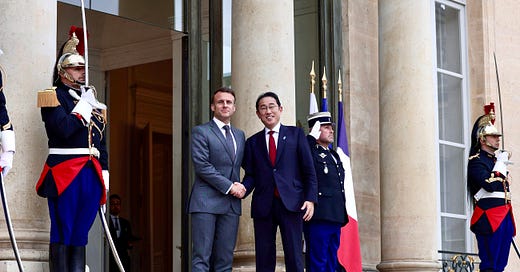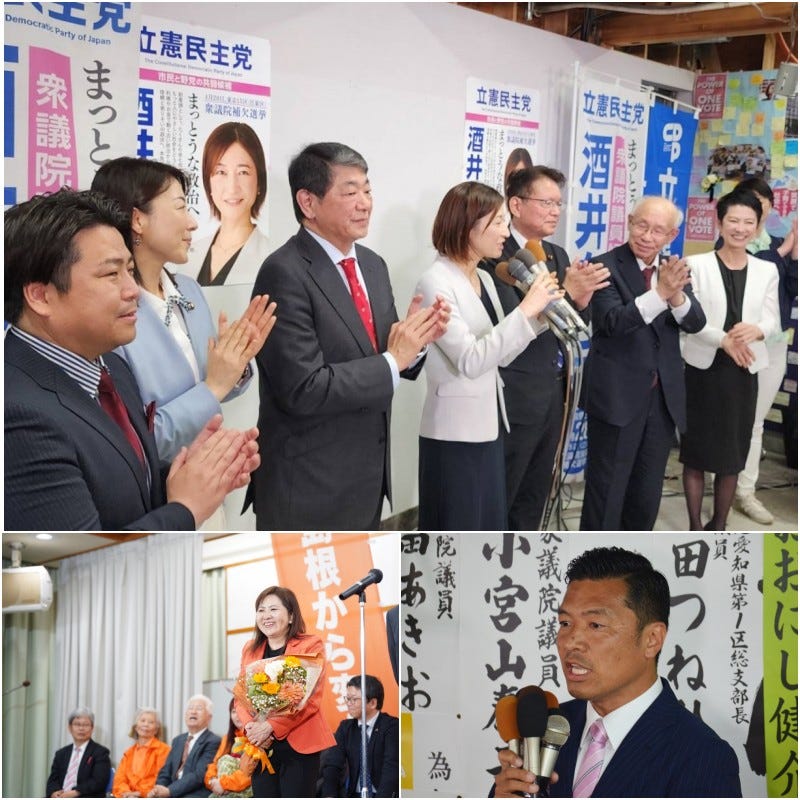Golden Week blues | This week in Japanese politics
Fallout from the by-elections, constitutional revision chatter, and Golden Week travel. Plus: did the Japanese government intervene in foreign exchange markets?
Thank you for reading Observing Japan. “This Week in Japanese Politics” is published on Friday for paid subscribers.
If you are looking for timely, forward-looking analysis of the stories in Japans’s politics and policymaking that move markets, I have launched a new service through my business, Japan Foresight LLC. For more information about Japan Foresight’s services or for information on how to sign up for a trial, please visit our website or reach out to me.
The Constitutional Democratic Party (CDP) wins all three by-elections, putting a damper on Prime Minister Kishida Fumio’s hopes of calling a snap election and cruising to a new term as Liberal Democratic Party (LDP) president.・Kishida may try to use constitutional revision as a vehicle for improving his chances of survival. ・Meanwhile, although Japanese government officials have declined to comment, it appears that, after the yen reached JPY 160/USD, Tokyo intervened in foreign exchange markets. ・As is traditional, the prime minister and members of his cabinet used the Golden Week holidays to travel abroad, with Kishida in France and South America, Foreign Minister Kamikawa Yōko in Africa before joining Kishida in Paris, and Defense Minister Kihara Minoru in Hawaii.
Politics
The Constitutional Democratic Party (CDP) swept the three by-elections on 28 April, complicating Prime Minister Kishida Fumio’s bid to win another three-year term at the helm of the Liberal Democratic Party (LDP) in September.
In a press conference on 30 April, Kishida apologized for the LDP’s scandals and said he was not thinking at all about a snap election. But even now, with senior LDP officials openly calling on him not to call a snap election, questions remain about Kishida’s thinking.
The Constitutional Democratic Party (CDP), meanwhile, is trying to read what the by-elections suggest about the party’s chances in the next general election. CDP leader Izumi Kenta responded to his party’s victories by calling for a snap election, functioning as a test of the public’s confidence in the prime minister.
LDP officials took to the airwaves to share their thoughts on the party’s crisis. Inada Tomomi, Abe Shinzō’s onetime protégé and a current LDP acting secretary-general warned that the party is facing an increasingly grave crisis, saying in a TV appearance on 29 April that “there is a sense of danger that if the LDP does not change, it is the beginning of the end.” Ishiba Shigeru, once and possibly future contender for the party’s leadership, warned that if the party does not carefully study its polls and exit polling, he feels that “the next election will be quite tough.” Ishida also said that while a snap election is a decision for the prime minister, he hopes that Kishida will think carefully and not gamble with the destiny of the nation (and the destiny of lawmakers).
Kōmeitō leader Yamaguchi Natsuo joined others in suggesting that the prime minister take the signals of the by-elections to heart and focus on restoring public trust in his party (instead of thinking about a snap election).
The Tokyo Public Prosecutor’s Office decided against indicting Abe faction members Hagiuda Kōichi and Sekō Hiroshige for failing to report funds received via the kickback scheme on their statements.
Keep reading with a 7-day free trial
Subscribe to Observing Japan to keep reading this post and get 7 days of free access to the full post archives.




